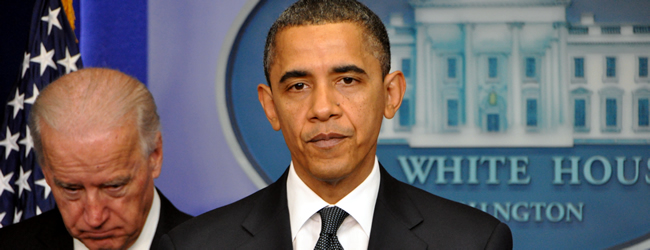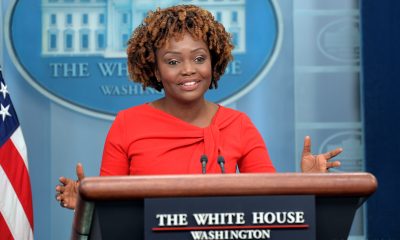National
High hopes for State of the Union speech
Activists want Obama to endorse same-sex marriage

Support for same-sex marriage tops the list for what LGBT rights supporters want to hear from President Obama next week during his State of the Union address.
The demand from advocates makes for great expectations for the speech, which is set to take place before a joint session of Congress on Tuesday.
An opponent of same-sex marriage, Obama has suggested his position could “evolve” on the matter and said last month he’s “wrestling” with the idea of marriage rights for gay couples.
Obama hasn’t stated support for same-sex marriage even though several states — including Rhode Island and Maryland — could advance marriage equality legislation this year, while others — including New Hampshire, Indiana and North Carolina — could see restrictions on such rights.
Rea Carey, executive director of the National Gay & Lesbian Task Force, said stating support for same-sex marriage during the State of the Union address would demonstrate Obama’s leadership.
“We would like for him to publicly state his support for marriage equality,” Carey said. “We have wanted him to lead on this issue. He has talked about … experiencing some evolution, and we’d like to say, ‘Evolve now!'”
Carey said she expects that Obama will discuss the economic hardships facing the country, which she said would present an opportunity for the president to acknowledge that a lack of marriage rights exacerbates these problems for same-sex couples.
“One of these stresses for same-sex couples on their families is because we can’t get married in so many places and because of DOMA, there are so many ways that we do not have protections for our families that are only adding stress in this economic climate,” she said.
Richard Socarides, president of the media watchdog group Equality Matters, also said Obama should talk about his “journey of evolution” and come out in support of marriage rights for same-sex couples.
“I think that it’s important for him to get to the other side of the journey as quickly as possible because he is the leader of our country and he needs to be leading us and the nation in a direction of acceptance of full equality for LGBT people,” Socarides said.
Still, Socarides said he thinks Obama will focus on the economy as well as the political tone in Washington and expressed skepticism that Obama would broach the topic of same-sex marriage during his speech.
“I think it would be a perfect opportunity for him to announce that his evolution is complete,” Socarides said. “But just because I think it’s a good idea doesn’t mean I think we’ll see it. I think he’s not there yet.”
Whether the president will even address LGBT issues during his speech remains in question. Shin Inouye, a White House spokesperson, said as of Blade deadline he had no updates on what would be included in the State of the Union address.
During a news conference Tuesday, White House Press Secretary Robert Gibbs said he didn’t know whether the president would address marriage or repeal of the Defense of Marriage Act during his speech.
Mentioning LGBT issues such as same-sex marriage during the State of the Union could be a catalyst for progress in the coming year.
Last year, President Obama’s mention of “Don’t Ask, Don’t Tell” was seen as the starting point for the path that led to the passage of legislation allowing for repeal of the law.
“This year, I will work with Congress and our military to finally repeal the law that denies gay Americans the right to serve the country they love because of who they are,” Obama said. “It’s the right thing to do.”
Socarides said the State of the Union address presents “the perfect place” for Obama to set up the path for advancement on LGBT issues like marriage rights for same-sex couples.
“When, as president, one mentions something in the State of the Union, you are conveying to the public at large that this is something that is crucially important to you,” Socarides said. “So, I think that highlighting the issue of marriage equality in the State of the Union speech would be very significant.”
In addition to support for same-sex marriage, LGBT rights supporters said they would like to hear about a trans-inclusive Employment Non-Discrimination Act in the address.
Autumn Sandeen, a San Diego-based transgender activist, said Obama needs to address employment discrimination experienced by transgender people as well as gays on the national level.
“Honestly, I would also just like to hear him say the word ‘transgender’ on the floor of the House,” she said. “That would be awfully nice.”
With Republicans in control of the U.S. House, Sandeen said she doesn’t think ENDA would pass Congress for at least the next two years and wants to hear from Obama on what he would do to address employment discrimination for the duration of that time.
Carey said renewing support for ENDA would be another way for Obama to recognize that economic hardships in the country are also affecting LGBT people.
“There are so many LGBT people in this country whose jobs are not protected from basic bias and discrimination,” Carey said. “We would like to see him call for those employment protections for LGBT people.”
Other issues that Carey identified as important for Obama to address include school bullying and passing immigration reform and ensuring that Social Security benefits aren’t cut.
U.S. Supreme Court
Supreme Court to consider bans on trans athletes in school sports
27 states have passed laws limiting participation in athletics programs

The U.S. Supreme Court on Thursday agreed to hear two cases involving transgender youth challenging bans prohibiting them from participating in school sports.
In Little v. Hecox, plaintiffs represented by the ACLU, Legal Voice, and the law firm Cooley are challenging Idaho’s 2020 ban, which requires sex testing to adjudicate questions of an athlete’s eligibility.
The 9th U.S. Circuit Court of Appeals described the process in a 2023 decision halting the policy’s enforcement pending an outcome in the litigation. The “sex dispute verification process, whereby any individual can ‘dispute’ the sex of any female student athlete in the state of Idaho,” the court wrote, would “require her to undergo intrusive medical procedures to verify her sex, including gynecological exams.”
In West Virginia v. B.P.J., Lambda Legal, the ACLU, the ACLU of West Virginia, and Cooley are representing a trans middle school student challenging the Mountain State’s 2021 ban on trans athletes.
The plaintiff was participating in cross country when the law was passed, taking puberty blockers that would have significantly reduced the chances that she could have a physiological advantage over cisgender peers.
“Like any other educational program, school athletic programs should be accessible for everyone regardless of their sex or transgender status,” said Joshua Block, senior counsel for the ACLU’s LGBTQ and HIV Project. “Trans kids play sports for the same reasons their peers do — to learn perseverance, dedication, teamwork, and to simply have fun with their friends,” Block said.
He added, “Categorically excluding kids from school sports just because they are transgender will only make our schools less safe and more hurtful places for all youth. We believe the lower courts were right to block these discriminatory laws, and we will continue to defend the freedom of all kids to play.”
“Our client just wants to play sports with her friends and peers,” said Lambda Legal Senior Counsel Tara Borelli. “Everyone understands the value of participating in team athletics, for fitness, leadership, socialization, and myriad other benefits.”
Borelli continued, “The U.S. Court of Appeals for the Fourth Circuit last April issued a thoughtful and thorough ruling allowing B.P.J. to continue participating in track events. That well-reasoned decision should stand the test of time, and we stand ready to defend it.”
Shortly after taking control of both legislative chambers, Republican members of Congress tried — unsuccessfully — to pass a national ban like those now enforced in 27 states since 2020.
Federal Government
UPenn erases Lia Thomas’s records as part of settlement with White House
University agreed to ban trans women from women’s sports teams

In a settlement with the Trump-Vance administration announced on Tuesday, the University of Pennsylvania will ban transgender athletes from competing and erase swimming records set by transgender former student Lia Thomas.
The U.S. Department of Education’s Office for Civil Rights found the university in violation of Title IX, the federal rights law barring sex based discrimination in educational institutions, by “permitting males to compete in women’s intercollegiate athletics and to occupy women-only intimate facilities.”
The statement issued by University of Pennsylvania President J. Larry Jameson highlighted how the law’s interpretation was changed substantially under President Donald Trump’s second term.
“The Department of Education OCR investigated the participation of one transgender athlete on the women’s swimming team three years ago, during the 2021-2022 swim season,” he wrote. “At that time, Penn was in compliance with NCAA eligibility rules and Title IX as then interpreted.”
Jameson continued, “Penn has always followed — and continues to follow — Title IX and the applicable policy of the NCAA regarding transgender athletes. NCAA eligibility rules changed in February 2025 with Executive Orders 14168 and 14201 and Penn will continue to adhere to these new rules.”
Writing that “we acknowledge that some student-athletes were disadvantaged by these rules” in place while Thomas was allowed to compete, the university president added, “We recognize this and will apologize to those who experienced a competitive disadvantage or experienced anxiety because of the policies in effect at the time.”
“Today’s resolution agreement with UPenn is yet another example of the Trump effect in action,” Education Secretary Linda McMahon said in a statement. “Thanks to the leadership of President Trump, UPenn has agreed both to apologize for its past Title IX violations and to ensure that women’s sports are protected at the university for future generations of female athletes.”
Under former President Joe Biden, the department’s Office of Civil Rights sought to protect against anti-LGBTQ discrimination in education, bringing investigations and enforcement actions in cases where school officials might, for example, require trans students to use restrooms and facilities consistent with their birth sex or fail to respond to peer harassment over their gender identity.
Much of the legal reasoning behind the Biden-Harris administration’s positions extended from the 2020 U.S. Supreme Court case Bostock v. Clayton County, which found that sex-based discrimination includes that which is based on sexual orientation or gender identity under Title VII rules covering employment practices.
The Trump-Vance administration last week put the state of California on notice that its trans athlete policies were, or once were, in violation of Title IX, which comes amid the ongoing battle with Maine over the same issue.
New York
Two teens shot steps from Stonewall Inn after NYC Pride parade
One of the victims remains in critical condition

On Sunday night, following the annual NYC Pride March, two girls were shot in Sheridan Square, feet away from the historic Stonewall Inn.
According to an NYPD report, the two girls, aged 16 and 17, were shot around 10:15 p.m. as Pride festivities began to wind down. The 16-year-old was struck in the head and, according to police sources, is said to be in critical condition, while the 17-year-old was said to be in stable condition.
The Washington Blade confirmed with the NYPD the details from the police reports and learned no arrests had been made as of noon Monday.
The shooting took place in the Greenwich Village neighborhood of Manhattan, mere feet away from the most famous gay bar in the city — if not the world — the Stonewall Inn. Earlier that day, hundreds of thousands of people marched down Christopher Street to celebrate 55 years of LGBTQ people standing up for their rights.
In June 1969, after police raided the Stonewall Inn, members of the LGBTQ community pushed back, sparking what became known as the Stonewall riots. Over the course of two days, LGBTQ New Yorkers protested the discriminatory policing of queer spaces across the city and mobilized to speak out — and throw bottles if need be — at officers attempting to suppress their existence.
The following year, LGBTQ people returned to the Stonewall Inn and marched through the same streets where queer New Yorkers had been arrested, marking the first “Gay Pride March” in history and declaring that LGBTQ people were not going anywhere.
New York State Assemblywoman Deborah Glick, whose district includes Greenwich Village, took to social media to comment on the shooting.
“After decades of peaceful Pride celebrations — this year gun fire and two people shot near the Stonewall Inn is a reminder that gun violence is everywhere,” the lesbian lawmaker said on X. “Guns are a problem despite the NRA BS.”
-

 U.S. Supreme Court2 days ago
U.S. Supreme Court2 days agoSupreme Court to consider bans on trans athletes in school sports
-

 Out & About2 days ago
Out & About2 days agoCelebrate the Fourth of July the gay way!
-

 Virginia2 days ago
Virginia2 days agoVa. court allows conversion therapy despite law banning it
-

 Maryland4 days ago
Maryland4 days agoLGBTQ suicide prevention hotline option is going away. Here’s where else to go in Md.












